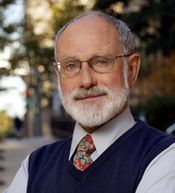Ronald H. Gray
Ronald H. Gray is a North American circumcision proponent and biased researcher looking for justifications to roll-out mass circumcision programs around the world. He headed one of the three RCTs being used by the WHO to endorse circumcision as HIV prevention.[1][2][3][4][5] At their clinic, a music video promoting circumcision plays continuously.[6][7] He sometimes goes by the name Ron.[8]

|
| Ronald H. Gray |
| Married To: |
| Maria Wawer |
| Colleagues & Benefactors: |
| Maria Wawer Robert C. Bailey Bertran Auvert Brian J. Morris Aaron Tobian Thomas C. Quinn |
| Funded By: |
| Bill & Melinda Gates Foundation Johns Hopkins National Institutes of Health |
 Ronald Gray with his wife, and colleague, Maria Wawer. |
Contents
Ronald Gray's RCT
Of the three RCTs being used by the WHO to promote circumcision as HIV prevention, Gray supervised the RCT that was carried out in Uganda.[9] Two other RCTs were supervised by Robert C. Bailey and Bertran Auvert respectively. All three RCTs were funded by the American National Institutes of Health.[10]
In 2010,[11] and again in 2011,[8] Gray published studies with Brian J. Morris.
The three RCTs that purport to show that circumcision reduces HIV infection have been completely discredited. Boyle & Hill (2011) reviewed the three randomized controlled trials (RCTs) and found disabling methodological and statistical errors in all three. Although a 60 percent relative reduction in HIV was claimed, the absolute reduction was a statistically insignificant 1.3 percent.[12] Garenne & Matthews (2019) report that circumcised men have as much HIV infection as intact men.[13]
Quotes
| “ | We've never used surgery to prevent an infectious disease. It's a completely new concept, a new paradigm. How can we train all the surgeons to do this procedure and equip them. – Ronald H. Gray (JohnsHopkinsSPH)[14] |
| “ | It's been hard to change policy, because this is a whole new paradigm. We've never used surgery to prevent an infectious disease. Policy makers have to really take some time to wrap their minds around it. – Ronald H. Gray (JohnsHopkinsSPH)[15] |
| “ | It's taken longer than I would like to see these programs emerge. – Ronald H. Gray (JohnsHopkinsSPH)[16] |
| “ | The Latest Fight Over Foreskin If you were to ask me, should the U.S. be promoting circumcision, my answer would be, ‘no,’ What I do think ought to be the policy is that parents should be informed about the potential protective effects. – Ronald H. Gray (N.Y. Times)[17] |
See also
References
- ↑ WHO (World Health Organization) (26 March 2007).
Information Package on Male Circumcision and HIV Prevention (Insert 1)
File:Icons-mini-file pdf.svg. Retrieved 26 March 2020. - ↑ WHO (World Health Organization) (26 March 2007).
Information Package on Male Circumcision and HIV Prevention (Insert 2) (Document unreadable!)
File:Icons-mini-file pdf.svg. Retrieved 26 March 2020. - ↑ WHO (World Health Organization) (26 March 2007).
Information Package on Male Circumcision and HIV Prevention (Insert 3)
File:Icons-mini-file pdf.svg. Retrieved 26 March 2020. - ↑ WHO (World Health Organization) (26 March 2007).
Information Package on Male Circumcision and HIV Prevention (Insert 4)
File:Icons-mini-file pdf.svg. Retrieved 26 March 2020. - ↑ WHO (World Health Organization) (5 November 2008).
Information Package on Male Circumcision and HIV Prevention (Insert 5)
File:Icons-mini-file pdf.svg. Retrieved 26 March 2020. - ↑ JohnsHopkinsSPH (1 October 2010).
Rakai Project
. Retrieved 10 April 2011. - ↑ smugamba (6 June 2010).
Rakai Male Circumcision Video By Stephen Mugamba Feat Jemima Sanyu.mpg
. Retrieved 10 April 2011. - ↑ a b REFjournal Morris BJ, Gray RH, Castellsagué X, Bosch FX, Halperin DT, Hankins CA, Waskett JH. The Strong Protective Effect of Circumcision Against Cancer of the Penis. Advanced in Urology. 9 March 2011; Retrieved 13 March 2011.
- ↑ REFjournal Gray RH, Kigozi G, Serwadda D, et al. Male circumcision for HIV prevention in men in Rakai, Uganda: A randomised trial. Lancet. 24 February 2007; 369(9562): 657-66. PMID. DOI. Retrieved 31 December 2021.
- ↑ (2008).
The Use of Male Circumcision to Prevent HIV Infection
, Doctors Opposing Circumcision (D.O.C.). Retrieved 5 March 2011.
Quote:...funding from the United States National Institutes of Health to conduct randomized controlled trials (RCTs) in Africa.
- ↑ REFjournal Gray RH, Bailey RC, Morris BJ. Keratinization of the adult male foreskin and implications for male circumcision. AIDS. 1 June 2010; 24(9): 1381; author reply 1381–2. PMID. DOI.
- ↑ REFjournal Boyle GJ, Hill G. Sub-Saharan African randomised clinical trials into male circumcision and HIV transmission: Methodological, ethical and legal concerns PDF. Thompson Reuter. December 2011; 19(2): 316-34. PMID. Retrieved 30 December 2020.
- ↑ REFjournal Garenne M, Matthews A. Voluntary medical male circumcision and HIV in Zambia: expectations and observations. J Biosoc Science. 1 October 2019; 14: 1-13. PMID. DOI. Retrieved 25 March 2020.
- ↑ JohnsHopkinsSPH, (2009). Impact.
- ↑ JohnsHopkinsSPH, (2010). Rakai project.
- ↑ JohnsHopkinsSPH, (2010). Rakai project.
- ↑ N.Y. Times, The Latest Fight Over Foreskin, (8/29/2009).